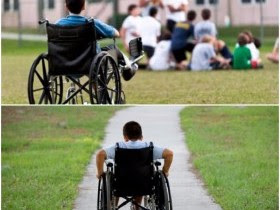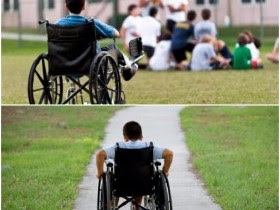Education for the need to take immediate action
One in ten cases reported to the Equality Authority for 2016 concerned violations of the legislation on equal participation of children with disabilities in the Cypriot education system
Just over one in ten complaints filed with the Independent Equality Authority for 2016 (12%) concerns violations of legislation on the right of persons with disabilities to education. In particular, according to a multi-page report by the Office of the Commissioner, the complaints relate to the need to remove barriers that restrict or exclude the participation of persons with disabilities.
Although the obstacles are identified, according to the position of the Commissioner of Administration, on many levels (legal, procedural, obstacles related to human resources), what was identified both by these complaints and by information that on a systematic basis reached the Principle of Equality, is that emphasis should be placed on resolving the behavioral and cognitive barriers that arise, which makes the whole process even more difficult, for two reasons.
First, because there are growing concerns about attitudes, attitudes, and approaches toward students with disabilities from individuals and groups of individuals involved in the education system, including the Ministry of Education and Culture itself, and second, while opposing attitudes and attitudes are maintained. Towards a legal approach to disability, it is very difficult to push for the necessary changes to remove the remaining obstacles.
Ignorance of teachers
If one looks at the complaints that were examined in 2016 concerning the violation of the Convention on the Rights of Persons with Disabilities, as well as the remarks made by the Equality Authority, one will find that a significant portion of competent bodies and persons involved in education ignorance about the nature and characteristics of the disability or even the way it interacts with each child's personality and identity.
As a direct consequence, the right to education is violated, while ignorance is observed in the obligations of the Ministry of Education and Culture to these people, as well as to all bodies related to the education system. The results of this seemingly harmless approach, however, carry far more risks than those involved imagined.
As the Commissioner explains through the reference to specific incidents that were examined last year, the wrong approach leads to:
·
To confuse characteristics related to disability with the character / personality of the child and are considered their responsibility,
· Provide insufficient, no or incorrect adjustments,
· Consider that children, and not school or inadequate adaptation / differentiation, are responsible for reactive behavior, or poor performance ("lazy", "bored" and "indifferent"),
Be led to exclusion inside or outside the classroom by specific courses or part of courses and
· To spread erroneous or phobic, stereotypical views such as that they are "dangerous".
Stigmatizing behaviors
Worth mentioning are specific references in the Commissioner's occasional reports, according to which there are many cases where children with disabilities become victims of stereotypes, rejections, hostility, or even violent behaviors and acts, which arise according to the cases studied from the Equality Authority, from the position that a child with a disability:
· Should not attend the "normal" class and the regular school (registered position of teacher and Parents' Association) or that he should be educated separately from children of their age (position of special teacher after a decision to attend a school for the Deaf) ,
· Is a "burden" for teachers, the school and its classmates, as it negatively affects the rest of the class and other children,
· Is equally responsible for any behavior (reactive, hostile) and not at all dealt with by the training scheme,
· Does not have the same value as the other children since he is or should be a child of the "unit", the "special" (this is a general attitude of principals and teachers),
· Can not be educated at the same level as his classmates (comments such as "he will not become a scientist" have been recorded, therefore there is no need to set high educational goals and expectations), therefore he does not need to participate in all courses and the interpretation does not have to correspond to the educational level of his classmates,
· Does not understand or has no hope for improvement, so insulting and degrading comments can be made in front of him such as "he should stay in the same class", regardless of the lack of adjustments, while cases of violence against children with disabilities have been reported on the grounds that it is intended to "comply" with them,
· It is only the job of the special educator, the escort or the interpreter or other "special" structures or even, it is the family's job to educate the child (this unacceptable position was expressed in writing by the Directorate of a specific school),
· He should not socialize with his classmates because he is aggressive and dangerous (teacher position).
As a result of the above, according to the Equality Principle, it is possible to: lower level education is provided,
· Do not recognize diversity or different types of learning (learning styles),
· On the basis of hypothetical rather than real data, to level the potential and abilities of children with disabilities before they are even given opportunities, through adaptations in teaching, communication and the use of appropriate tools,
· Children are not accepted by their classmates or teachers,
· Feel "invisible" or "burdensome" to others, discouraged and lose their self-esteem, give up, get frustrated, unwilling to go to school and, ultimately,
· Become victims of violent verbal or other behaviors, rights violations or be isolated from society, with consequences for the rest of their lives.
Objectives of those in charge
The permanent goal of the Ministry of Education, according to the Authority's remarks, should be the abolition of all segregation practices against children with disabilities and the consolidation of the principle that all educational institutions, including general teachers and their staff schools, have a responsibility to children with disabilities, just as children without disabilities do, with respect for the value of diversity.
Special abilities
Another important element is the need to identify the abilities of children with disabilities, a process that needs to be ongoing and facilitated through the provision of appropriate opportunities and methods. It should be acknowledged in practice that every child has abilities, talents, skills and personality and can develop. The tolerance of attitudes based on stereotypes and prejudices about disability fuels the position that these children have no place and are a burden in schools and children without disabilities.
Providing specialized customizations
The provision of personalized adjustments and support is an obligation, to which the Ministry of Education should respond within the framework of the right to education, and not an optional option. The oversimplified "generalizations" of the adaptations, per disability and in fact per category of disability (eg learning disabilities), nor the "packages" of adaptations, automatically based on one disability, are not enough. It needs personalization (through adaptations and support), which is a complex and demanding process, but it should be tested and evaluated for its effectiveness.
Effectiveness should be measured by reference to the degree of empowerment achieved by students in order to participate fully and effectively in education, while the evaluation of this process should correspond to the disability, personality and type of learning of each student.
Elimination of bullying
To combat abuse, harassment and other bullying and harassment due to disability and the comprehensive protection of children from such incidents, the Ministry should adopt an effective prevention policy as well as a system of dealing with reported incidents, through investigative procedures and appropriate trained individuals, but without administrative and bureaucratic delays as these, in practice, may lead to tolerance and recurrence of such incidents with consequences to the detriment of children with disabilities and the wider school environment.
Accessibility
Finally, emphasis needs to be placed on the accessibility of all school facilities, in order to meet every form and extent of disability (motor, visual and other) as well as the accessibility of teaching materials, but without discounts in terms of the quality of education. provided. With regard to the accessibility of both space and information and communication, it is emphasized that fragmentary and individual actions are not enough when and if requested by parents. Something much more is needed, that is, a systematic process of planning and conversions in all schools, while accessible material and accessible communications should be widely available for use at all times.
Source: Today

